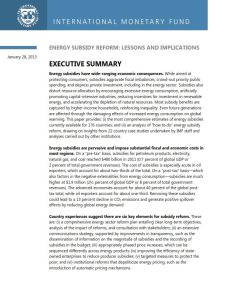
Recommendation
Although 176 nations sweeten the pot for oil and electricity producers and consumers, the International Monetary Fund (IMF) finds that such energy subsidies amount to a $1.9 trillion boondoggle hidden in plain sight. The IMF argues – based on a study of 22 nations – that these subsidies are a bad idea for a number of reasons. National handouts encourage consumption, discourage innovation and exacerbate household income inequality. The IMF urges national governments worldwide to pursue a six-step approach to ending subsidies, including creating a clear plan, and communicating the costs of subsidies and the benefits of ending them. While this report highlights the eye-popping costs of energy subsidies, its dry writing style may make some readers work a bit too hard. Yet, as reports go, it’s nicely laid out, with bold-faced highlights and an inviting design that highlights key data. getAbstract recommends this report to investors, policy makers, NGOs, energy executives and all those seeking insight about energy markets.
Summary
About the Author
International Monetary Fund (IMF) staff led by Benedict Clements prepared this report, which has contributions from two dozen IMF employees.







Comment on this summary